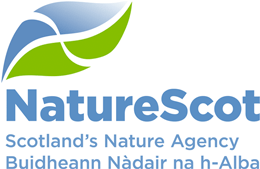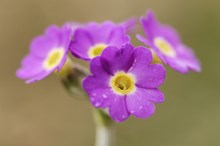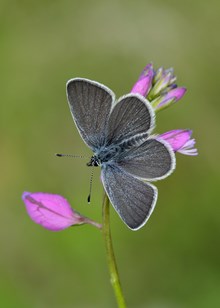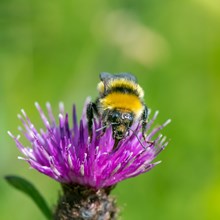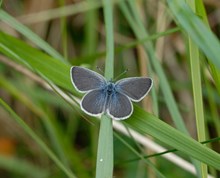11 May, 2023
New species conservation programme, Species on the Edge, launches their activity in the north coast.
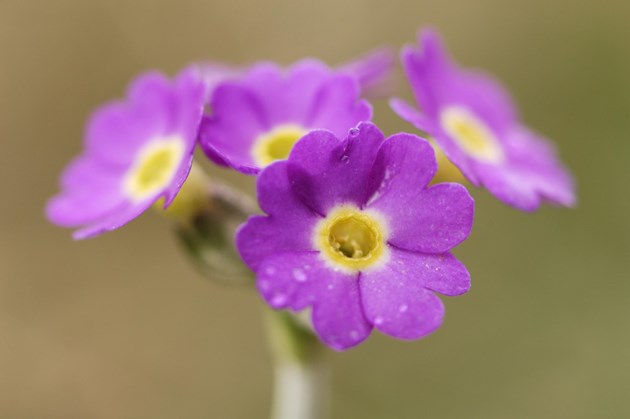
Species on the Edge, a new multi-species conservation programme, will kick off its activity in the north coast of Scotland with a launch event on Sunday 21st May at Dunnet Community Forest from 11am until 2pm.
Plantlife, the international conservation charity working to secure a world rich in wild plants and fungi, are leading the north coast programme of activity. Activity in the north coast area will primarily focus on supporting Scottish primrose, oyster plant, purple oxytropis, great yellow bumblebee and small blue butterfly, as well as investigating whether medicinal leech and plantain leaf beetle are present here.
Species on the Edge is a new bold and ambitious partnership programme of eight conservation organisations, all dedicated to improving the fortunes of 37 priority species found along Scotland's coast and islands. Programme activity is spread over seven project areas: the Inner Hebrides and Argyll; Solway; East Coast; North Coast; Orkney; Shetland; and the Outer Hebrides.
The Species on the Edge partnership consists of Amphibian and Reptile Conservation, The Bat Conservation Trust, Buglife, the Bumblebee Conservation Trust, Butterfly Conservation, NatureScot, Plantlife and RSPB Scotland. Together the eight organisations will be delivering a four-and-a-half-year programme of action, working closely with local communities to help them tackle the impacts of environmental change on wildlife, to benefit both nature & people. The programme has a cost of over £6.5 million, with £4m of funding from the National Lottery Heritage Fund.
Throughout the four-and-a-half-year programme, Species on the Edge Project Officers will be connecting with communities, land managers, organisations, and charities to help protect our unique local wildlife. The programme will be offering local people opportunities to gain new skills and knowledge through workshops, training and volunteering.
Sarah Bird, Senior Project Officer, says: “The north coast is home to some of Scotland’s most beautiful and most vulnerable wildlife. Come along to our launch event to find out more about Species on the Edge on the north coast, and see how you can join in this exciting project to help our wonderful wildlife. Together, we can help protect fragile species that are found in this area.
"On the day, people will have the chance to help us survey potential sites for a new butterfly bank and to take home some kidney vetch seed to grow to benefit local wildlife. There will be fun activities for children as well as plenty of cake! So whoever you are, whether you’re an experienced biological recorder or completely new to conservation and just want to find out more, we’d love to see you.”
The four-year programme of conservation action will include community-based work that aims to creatively inspire and enthuse people about their natural environment and explore the values and concerns that communities hold in relation to conservation work on the north coast. Led by Louise Senior, People Engagement Officer, this aspect of the programme kicks off on the north coast with a series of ‘Watercolour Wellbeing Workshops’ delivered by Plantlife’s artist in residence, Iris Hill. Sessions are planned in Durness, Skerray and Castletown. To find out more, please contact louise.senior@plantlife.org.uk
Look out for the Species on the Edge national launch event in Logie Quarry, Tain, on Saturday 3rd June.
Find out more about Species on the Edge on their website: https://www.nature.scot/scotlands-biodiversity/species-edge-sote/species-edge-about-project
And follow along with the programme on Twitter (@SpeciesEdge) and on Facebook.
Contact information
- Name
- NatureScot Media
- Telephone
- 0131 316 2655
- media@nature.scot
Notes to editors
Species on the Edge is a partnership programme of eight organisations, funded by The National Lottery Heritage Fund. The partnership consists of Amphibian and Reptile Conservation, The Bat Conservation Trust, Buglife, Bumblebee Conservation Trust, Butterfly Conservation, NatureScot, Plantlife and RSPB Scotland.
Plantlife is the international conservation charity working to secure a world rich in wild plants and fungi. Founded in 1989, Plantlife has 15,000 members and supporters.
Wild plants and fungi are the foundation of all life on Earth. Plantlife enhances, restores, protects and celebrates our natural heritage through working with landowners, other conservation organisations, public and private bodies and the wider public. Plantlife owns 23 nature reserves covering nearly 4,500 acres across England, Scotland and Wales. We were instrumental in the creation of the Global Strategy for Plant Conservation, the Important Plant Area network and we are a registered COP Observer contributing to international conventions on climate and biodiversity. We are governed by a board of 12 trustees and have around 70 staff, located across the UK. We also support a team of 1500 volunteers who work in the field, at events and in our offices. Our Patron is The former Prince of Wales. See www.plantlife.org.uk for more information.
NatureScot is Scotland's nature agency. We work to enhance our natural environment in Scotland and inspire everyone to care more about it. Our priority is a nature-rich future for Scotland and an effective response to the climate emergency. For more information, visit our website at www.nature.scot or follow us on Twitter at https://twitter.com/nature_scot
The Amphibian and Reptile Conservation Trust (ARC) is a national wildlife charity focusing on toads, frogs, newts, snakes, lizards and marine turtles. ARC conserves amphibians and reptiles, and the habitats on which they depend, to protect them for future generations. The Trust runs species recovery programmes, monitoring, scientific research, advocacy, outreach and regional projects. ARC owns 24 nature reserves and manages 80, covering 1,900 hectares, and works with a wide range of partner organisations, volunteers and specialists. ARC continues a 50-year history of reptile and amphibian conservation. The charity was established in June 2009 by the Herpetological Conservation Trust (HCT), which was formed in 1989. HCT grew out of the British Herpetological Society’s Conservation Committee, formed in 1969. For more information visit www.arc-trust.org
The Bat Conservation Trust is the leading non-governmental organisation in the United Kingdom solely devoted to the conservation of bats and the landscapes on which they rely. The breadth and depth of our work is driven by our vision of a world rich in wildlife where bats and people thrive together. Through monitoring and direct conservation action we can secure the future of our bat species in Scotland.
Buglife - The Invertebrate Conservation Trust is the only charity in Europe devoted to the conservation of all invertebrates. Our aim is to halt the extinction of invertebrate species and to achieve sustainable populations of invertebrates across the UK. We are working hard to achieve this through: Undertaking practical conservation projects that will contribute to achieving our aim. Promoting the environmental importance of invertebrates and raising awareness about the challenges to their survival. Assisting in the development of legislation and policy that will ensure the conservation of invertebrates. Developing and disseminating knowledge about how to conserve invertebrates. Encouraging and supporting invertebrate conservation initiatives by other organisations in the UK, Europe and worldwide.
Further information is available on Buglife’s website at www.buglife.org.uk, follow us on Twitter: @BuglifeScotland and ‘Like us’ on Facebook: Buglife – The Invertebrate Conservation Trust.
The Bumblebee Conservation Trust is a membership charity that was established in 2006 due to serious concerns about the ‘plight of the bumblebee’. In the last 80 years many bumblebee populations have crashed and two species have become extinct in the UK. The Trust carries out science, conservation, and people engagement projects across the UK www.bumblebeeconservation.org
Butterfly Conservation is the UK charity dedicated to saving butterflies, moths and our environment. Our research provides advice on how to conserve and restore habitats. We run projects to protect more than 100 threatened species and we are involved in conserving hundreds of sites and reserves across the UK.@savebutterflies
BC has more than 2200 members living in Scotland where we work closely with local communities, landowners, the Scottish Government, Scottish Natural Heritage and other conservation partners, to safeguard Scotland’s butterflies, moths and their habitats. www.butterfly-conservation.org/scotland
RSPB Scotland is part of the RSPB, the UK’s largest nature conservation charity. Protecting habitats, saving species and helping to end the nature and climate emergency. Nature is in crisis. Together we can save it.
NatureScot is Scotland's nature agency. We work to enhance our natural environment in Scotland and inspire everyone to care more about it. Our priority is a nature-rich future for Scotland and an effective response to the climate emergency. For more information, visit our website at www.nature.scot or follow us on X at https://x.com/NatureScot
’S e NatureScot buidheann nàdair na h-Alba. Bidh sinn a’ neartachadh àrainneachd na h-Alba agus a’ brosnachadh dhaoine gu barrachd suim a chur ann an nàdar. Tha e mar phrìomhachas againn gum bi nàdar na h-Alba beairteach agus gun dèilig sinn gu h-èifeachdach le èiginn na gnàth-shìde. Tha an tuilleadh fiosrachaidh aig www.nature.scot no air X aig https://x.com/NatureScot
